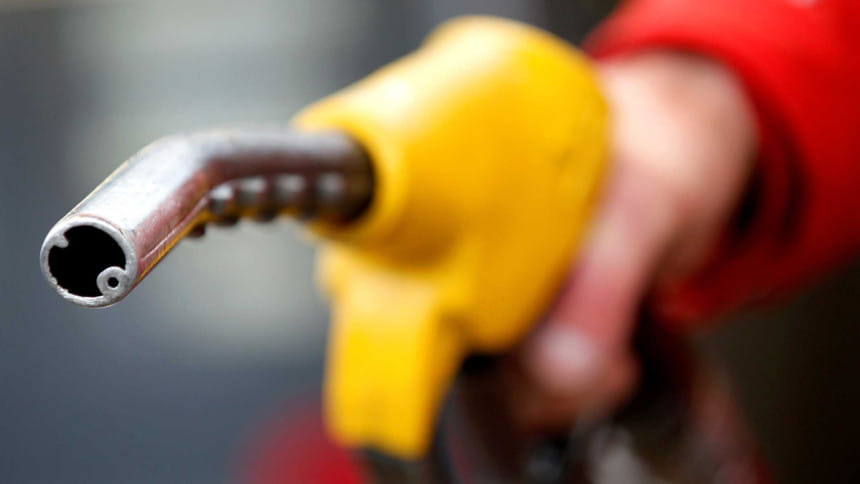The real victims of fuel price hikes are end consumers

The announcement of fuel price hike, made on November 3 by the Ministry of Power, Energy and Mineral Resources, could not have come at a worse time. Just when the economy is trying to gear back on track, and people have slowly begun to breathe some fresh air and return to their workplaces—desperately attempting to recover from the economic stress they have been facing because of Covid-19—they are now facing additional challenges. Worse, this is not a challenge from nature; it's man-made. Already, non-food inflation has been rising for the last three months. Prices of essentials have also been on the rise recently. Raising diesel and kerosene prices by as much as 23 percent is now a double whammy on the helpless consumers, who are losers on all counts.
Whenever there is a price hike of petroleum products in the country, the government presents a number of reasons to the people. Those are all well-known reasons. The fact that higher prices would ultimately be passed on to consumers is also a widely practised technique. Then why are such measures taken by the policymakers? One can revisit their arguments to see where the real problem lies.
The international prices of fuel are seeing an upward pressure in view of the rapid recovery attempts by the global economies. As economic activities have increased and are moving ahead with higher consumer demand, there is a shortage of supplies in the market. Thus, higher demand, shortages in supply, and an increase of commodity prices have accelerated the inflation in several developed and developing economies. The International Monetary Fund (IMF), in its report titled "World Economic Outlook: Recovery During a Pandemic" in October 2021, predicted that this trend may continue till the middle of 2022.
If this is the logic behind raising fuel prices in Bangladesh, then why don't we see lower prices of petroleum products when they go down in the international market? Fuel prices were low for the last seven or eight years. Economies like Bangladesh, which depend on petroleum imports, have benefitted hugely during this period. The Bangladesh Petroleum Corporation (BPC), which runs mostly in loss, made profits after perennial losses. However, electricity prices increased many times during that period. During the pandemic, BPC profits increased by a higher amount as prices were low. According to the Bangladesh Economic Review 2021 by the Ministry of Finance, in the 2020-21 fiscal year, the BPC earned Tk 5,839.39 crore in profits, which was Tk 5,066.54 crore in FY 2019-20.
Consumers don't benefit from such low fuel prices. Fuel prices in Bangladesh are not determined by the demand and supply in the market—the government fixes them. In that case, consumers also deserve the benefit of lower prices in the international market. After all, the losses that the BPC suffers are not due to the customers' fault. It is because of the mismanagement, system loss and weak supply chain in the BPC. Due to its poor governance, the fuel marketing companies get involved in corruption and consumers' interest takes a backseat. Thus, the BPC not only needs to work to improve the fuel pricing mechanism, but also to strengthen the supply chain and procurement mechanism. Nowadays, many countries take part in futures market for commodity trading, including that of petroleum products. Bangladesh cannot take advantage of the low prices in the international market as the existing law in the country does not allow the BPC to take part in the futures market. The country could purchase fuel at a cheaper price in advance when prices are low internationally, and save a large amount of money. Of course, there are risks attached to this—for example, if the price fall is steep and fast, there will be a loss. Can a country like Bangladesh afford that? The answer is, if one takes part in the futures market, everyone has to follow the rules of the game and accept both positive and negative outcomes. Initially, the country can start with purchasing a part of the total requirement through the futures market. Of course, such measures require an outlook change on the BPC's part.
The other common reason given by the policymakers for price readjustment is the lower prices in our neighbouring countries, particularly in India, which creates opportunities for smugglers to take petroleum products out of the country to the Indian border. But what amount of the total fuel reserve in the country is smuggled out? Besides, this is not the fault of innocent consumers. This is, again, a governance issue.
The increased price of diesel is going to affect many sectors of our economy. Diesel makes for 70 percent of the total fuel that is consumed in Bangladesh. Sectors such as road and water transports, power generation and agricultural production are dependent on diesel. It took no time for the transport sector leaders to demand an increase in bus and water transport fares in reaction to the government's decision to raise the diesel price. They said they wanted to make up for the increased fuel price, referring to the loss they incurred during the pandemic. But pandemic or no pandemic, passing the extra cost onto the passengers is an age-old tactic. The irrigation cost is expected to rise, also leading to higher prices of crops and produce, though the farmers may not necessarily be the beneficiaries of higher commodity prices. Consumers will also have to suffer due to the higher costs of goods transportation, since the prices of essentials are expected to rise. Though kerosene is used by a smaller number of people nowadays, the high price of kerosene will impact poor consumers as well.
This is a time when the government should provide some breathing space to the people of the country, instead of increasing prices, so that people can recover better. It could cut taxes on fuel prices for some time, so that the burden on people is lighter, and people could have some time to recover from the pandemic-induced stress. The burden of fuel price hikes will not only fall on general consumers, but also businesses, especially the small businesses who were hit the hardest during the pandemic. The government collects various types of taxes, including value-added tax (VAT), duty, and trade tax, on fuel prices. Such taxes now account for about 30 percent of the fuel price. A part of this could be sacrificed during this difficult period. Such measures are not unheard of: India slashed taxes on petrol and diesel in an attempt to reduce their prices and give some respite to their people. In view of very high electricity and gas prices this year, 20 countries in the European Union took emergency measures that included cuts in energy tax or providing subsidies to poor households.
Transparent pricing mechanism is essential to address unpleasant situations created every time when upward price adjustments are made by the government. Instead of an arbitrary decision from the top, consultation with relevant stakeholders such as transport owners, representatives from the agriculture sector, small traders, and consumer rights associations can help avert the sufferings of the common people.
Unfortunately, whenever there is an announcement by the government on fuel price hike, the knock-on effect is felt much too early. It is even sooner than when the announced measure is implemented. This time is no exception. Prices of a host of goods and services are already seeing an upward trend. This could delay the economic recovery of the country.
Dr Fahmida Khatun is executive director at the Centre for Policy Dialogue (CPD).

 For all latest news, follow The Daily Star's Google News channel.
For all latest news, follow The Daily Star's Google News channel. 



Comments